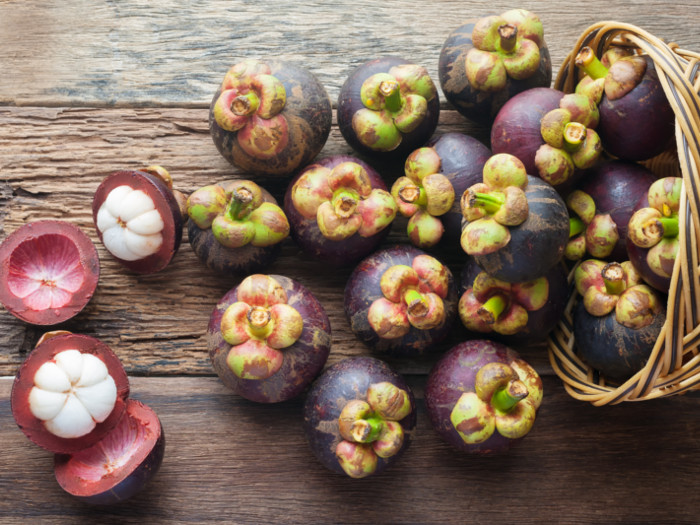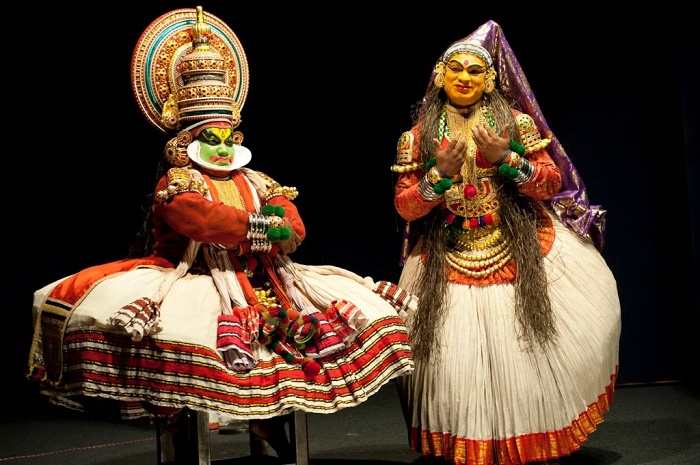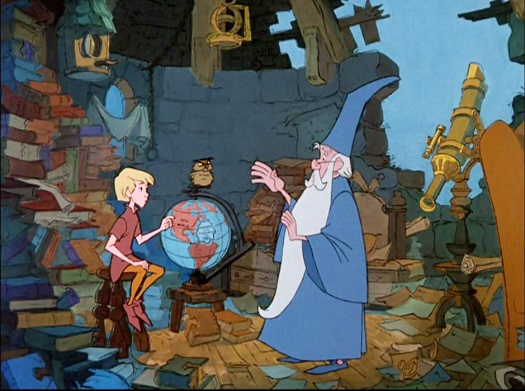The Once and Future King by T.H. White
Spoiler Alert: Plot Summary
The Once and Future King is a retelling of the now classic Arthurian legend of yore. We begin with Arthur (nicknamed the Wart) as a boy, thinking he is a nobody and a gentleman's ward. Little does he know, though, that he is to pull the sword from the stone and reveal himself to be the RIGHTFUL HEIR TO THE THRONE! (I know, big twist. Maybe you saw the Disney movie so you were expecting it. Or maybe you know the legend.) So Arthur goes off to run England, with some support and guidance from his boyhood tutor, Merlyn. All of the things you have probably heard then happen - he marries Guenever, he makes the Round Table of Knights, Lancelot comes, there's a whole love triangle between G and A and T, Arthur accidentally knocks up his half-sister (SUPES NORMAL), and lots of battling and fighting ensues. Mordred, Arthur's son/nephew (emphasis on the EW) causes some trouble and things go downhill from there. In the end, all that's left is Arthur's legacy and his idealistic dream.
Spoiler Over: Continue Here
Well hello, there, blobbists! How is everyone doing this (not-so) fine Friday? Here, it has looked like (and been like) rain off and on all day. Susan and I are glad to be in for the evening, though I am mildly dismayed that it is already nearly dark. (Susan does not care.) NOTE: While writing this blob, the sun has come back out. #colormeconfused
If this picture looks familiar, then you probably saw the Disney film, 'The Sword in the Stone.' I couldn't figure out why the first part of this book felt so familiar to me, and I knew I hadn't read it before. Eventually, I googled it, and realized that they based the Disney film specifically off of T.H. White's version of the story; to be precise, the first quarter of this book (which is sub-titled, 'The Sword in the Stone'.)
Mystery SOLVED!
I have only very vague recollections of the film, but they were just strong enough to make me feel like I was visiting an old friend when I was first starting the book, which was a very pleasant feeling.
Here are some bits I liked:
- The Forest Sauvage
"The mad and wicked animals were not the only inhabitants of the crowded gloom. When men themselves became wicked they took refuge there, outlaws cunning and bloody as the gore-crow, and as persecuted.
The first part of the book takes place in a castle nestled in the 'Forest Sauvage' (the Wild Forest) and I loved the way it was described. There's something deeply magical and fantastical about a really good forest, don't you think? (Forbidden Forest, Mirkwood, Fangorn, Archenland)
- Merlyn
Merlyn was my FAVORITE. I was very sad that Merlyn mostly disappeared after the first section - I felt like that was the very best part of the book, and I wanted all of the book to be like that first part. Here are a few highlights:
- The magician was staring at him with a kind of unwinking and benevolent curiosity which made him feel that it would not be at all rude to stare back, no ruder than it would be to stare at one of his guardian's cows who happened to be thinking about his personality as she leaned her head over a gate. Hagh!
- There were thousands of brown books in leather bindings, some chained to the book-shelves and others propped against each other as if they had had too much to drink and did not really trust themselves. so cute!
- "Merlyn took off his pointed hat when he came into this chamber, because it was too high for the roof, and immediately there was a scamper in one of the dark corners and a flap of soft wings, and a tawny owl was sitting on the black skull-cap which protected the top of his head.
'Oh, what a lovely owl!' cried the Wart.
But when he went up to it and held out his hand, the owl grew half as tall again, stood up stiff as a poker, closed its eyes so that there was only the smallest slit to peep through - as you are in the habit of doing when told to shut your eyes at hide-and-seek - and said in a doubtful voice:
'There is no owl.'
Then it shut its eyes entirely and looked the other way." lololololoololzzzzz Archimedes!
And, my favorite:
Wart: "I wanted to mention that you have been knitting your beard into the night-cap for three rows now.'
Merlyn: 'Well, I'll be...'
Wart: 'I should think the best thing would be to cut off the end of your beard. Shall I fetch some scissors?'
Merlyn: 'Why didn't you tell me before?'
Wart: 'I wanted to see what would happen.'
Merlyn: 'You run a grave risk, my boy, of being turned into a piece of bread, and toasted.'
With this he slowly began to unpick his beard, muttering to himself meanwhile and taking the greatest pains not to drop a stitch.
Not only do I love how hilarious this exchange is, but I am also DELIGHTED that Merlyn KNITS!
- King Pellinore and the Questing Beast
Besides Merlyn, my other favorite character is King Pellinore, who is on a lifelong quest to hunt the Questing Beast (which is described as a having a weird blend of animal features and being most formidable). This is the exchange when Wart first meets him, and King Pellinore is talking about the dog who accompanies him on the quest:
"Gets a bit lonely without her, following the Beast about, and never knowing where one is. Makes a bit of company, you know.
'She seems to have a friendly nature.'
'Too friendly. Sometimes I doubt whether she is really chasing the Beast at all.'
'What does she do when she sees it?'
'Nothing.'" Hgahahgahgahgahghaghaghaghaghhaghaghahghaghahaghaghagha.
Other AMAZING moments involving the Questing Beast:
- When King Pellinore nurses the Questing Beast back to health so they can quest some more
- When Sir Grummore and Sir Palomides decide "they must dress up and assume the role of Questing Beast" and be hunted themselves to cheer up the lovesick King P.
- When the real Questing Beast falls in love with the fake Questing Beast. ("Are you suggesting that we should flirt with this reptile of yours?"
lolololollllz. I died. This scene was too funny.)
The Badger reading the Wart his treatise
The Wart is turned into a variety of animals as part of his tutelage (by Merlyn), and this moment with the Badger was my favorite:
"Hem,' said the badger.
He immediately became paralysed with shyness, and sat blushing at his papers, unable to begin.
'Go on,' said the Wart.
'It is not very good,' he explained coyly. 'It is just a rough draft, you know. I shall alter a lot before I send it in." So cute! I love the shy badger, nervous to read his treatise. It reminded me of this scene from Narnia:
When Peter needs marshals for his one-on-one battle with Miraz, one of the Three Bulgy Bears asks to be a marshal. Trumpkin whispers to Peter, "Don't let him. He's a good creature, but he'll shame us all. He'll go to sleep and he will suck his paws." Peter says he can, as long as he doesn't suck his paws. The bear promises not to, at which point Trumpkin points out that he is doing it right at that very moment. (Incidentally, in the battle, the bear does in fact suck his paws.)
Bits I Didn't Like as Much
- Wart spending long periods of time as an animal - they were well-written, but after he was an ant for a while, or a fish, or insert animal here, I just got bored
- Disgusting food descriptions - generally, in fantasy novels, one WANTS to eat the food. The British food described, however, was MOST unappetizing to me. Cold venison for breakfast? #thanksbutnothanks
- How often we were reminded that Lancelot was ugly - White seemed to think it was Very important to mention this, and I got tired of hearing it. It is so wrong that I wanted Lancelot to look like Richard Gere from First Knight? ;)
- Hunting - there's lots of it, some of which is fairly graphic.
- Deciphering the vernacular of the G family (Gawaine, Gaheris, Gareth, aGravaine) - We get it, they're from the Gaelic side, but does it have to be SO hard to read all of their conversations?
- When the awful G boys killed the unicorn to try to get their mother's attention - This happened. And it was mostly just unspeakably sad. Their mom, Morgause, Morgan le Fay's sister, also didn't notice, and then when she did, she had them whipped for it, so it didn't really work out for them. Or the unicorn.
- The whole Lancelot and Guenever bit and how we're supposed to root for them - Honestly, I wasn't rooting for Arthur and Guenever either. In this version, I just felt TOTALLY unconnected to the characters once they were older. We spent a good amount of time with Wart when he was younger, but once he got older and became king, we didn't really connect with him. When the book ended, I just sort of went, "oh. well that's that."
- White's misogyny and general absence of female characters - I suppose you could argue that he's portraying the misogyny of the period, but I feel like in fantasy you can play around and mix things up (isn't that the whole point of fantasy?) So after like 500 pages I was tired of not seeing women or only seeing them in exceedingly unfavorable lights.
Referents and Reverberations (HP mania)
As I read the first section of this novel, there were so many things that reminded me of the Harry Potter series, and I loved wondering if Rowling had read White, and if that found its way into the world of Hogwarts. Merlyn reminded me of Dumbledore, and in his office, there are references to a phoenix, a basilisk, and Mandrakes (eek!) and his pet owl, Archimedes. There are several references to someone named You-Know-Who as well. Wisps of magic floating from one book to the next!
Other books this book reminded me of
In addition the HP series, this book also reminded me of...
- The Lord of the Rings by J.R.R. Tolkien
- I Capture the Castle by Dodie Smith
- A Wrinkle in Time by Madeleine L'Engle
- The Chronicles of Narnia by C.S. Lewis
- Le Petit Prince by Antoine de Saint-Éxupéry
- Watership Down by Richard Adams
- Don Quixote by Miguel de Cervantes
- Beatrix Potter stories (by Beatrix Potter)
I know I've mentioned this in previous posts, but how come so many of the great fantasy novels are written by Brits? England does have a rich literary history, but isn't it time for America to represent? We do, of course, have the lovely Madeleine L'Engle. Though she's more Christian-leaning than I'd prefer in my fantasy, and George R.R. Martin, but he's more misogynistic and gross than I like. I haven't read Ursula Le Guin yet, so I'll weigh in on her when I get there for the blob! Do you have American fantasy novelists you adore, blobbists? Please share - I'm most curious!
Words I Learned
 austringer
austringer - a keeper of goshawks; a falconer
baldrick - a belt worn over one shoulder that is typically used to carry a weapon (usually a sword) or other implement such as a bugle or drum
dimity - a hard-wearing, sheer cotton fabric woven with raised stripes or checks
 fritillary -
fritillary - 1. a Eurasian plant of the lily family, with hanging bell-like flowers; 2. a butterfly with orange-brown wings that are checkered with black
 hurdy-gurdy -
hurdy-gurdy - a musical instrument with a droning sound played by turning a handle, which is typically attached to a rosined wheel sounding a series of drone strings, with keys worked by the left hand
miasma - a highly unpleasant or unhealthy smell or vapor; an oppressive or unpleasant atmosphere that surrounds or emanates from something

seneschal - the steward or major-domo of a medieval great house
tintinnabulation - a ringing or tinkling sound
tumulus - an ancient burial mound; a barrow
A few lines I particularly liked:
For a fantasy novelist, T.H. White has a wonderful way with words. Not all world-builders are also lyricists, but he was definitely both.
- For the hay was an element to them, like sea or air, in which they bathed and plunged themselves and which they even breathed in. My mother loves the smell of hay from growing up on a farm, and I have vivid memories of driving along the farms near her house, rolling down the windows in the car, and breathing in deep gulps of the fresh scent.
- At first he only dipped below the surface of sleep, and skimmed along like a salmon in shallow water, so close to the surface that he fancied himself in air.
- The passion of nocturnal secrecy was a wine in his blood.
- Their faces were fanatical, and they babbled of dreams.
- They stitched uneasily, the needles fusing through the dark material with a long gleam like falling stars.
- Lanterns flickered outside, in the village street, as everybody went home in bands for fear of the moonlit wolves, and the Castle of the Forest Sauvage slept peacefully and lightless, in the strange silence of the holy snow.
I'll leave you with a few of my favorite scenes. The first one is about winter and snowfall, and it made me very very hopeful that one day I will get to spend that holiday knee deep in gorgeous white stuff.
It was Christmas night in the Castle of the Forest Sauvage, and all around the castle the snow lay as it ought to lie. It hung heavily on the battlements, like thick icing on a very good cake, and in a few convenient places it modestly turned itself into the clearest icicles of the greatest possible length. It hung on the boughs of the forest trees in rounded lumps, even better than apple-blossom, and occasionally slid off the roofs of the village when it saw the chance of falling on some amusing character and giving pleasure to all.
And the last one is advice from Merlyn that I think we can all stand to take to heart.
The best thing for being sad is to learn something. That is the only thing that never fails. You may grow old and trembling in your anatomies, you may lie awake at night listening to the disorder of your veins, you may miss your only love, you may see the world about you devastated by evil lunatics, or know your honour trampled in the sewers of baser minds. There is only one thing for it then - to learn. Learn why the world wags and what wags it. That is the only thing which the mind can never exhaust, never alienate, never be tortured by, never fear or distrust, and never dream of regretting. Learning is the thing for you.
So the next time you're feeling blue (or if you're feeling blue right now!) go learn something - a new word, a new skill, or even just a fun fact (A snail can sleep for three years. Slugs have four noses. Rhinoceros horns are made of hair. Et cetera, et cetera, et Cetera!) and just maybe it will cheer you up! I'm off to learn more about why the world wags and what wags it. Good afternoon, good evening, and good night!















